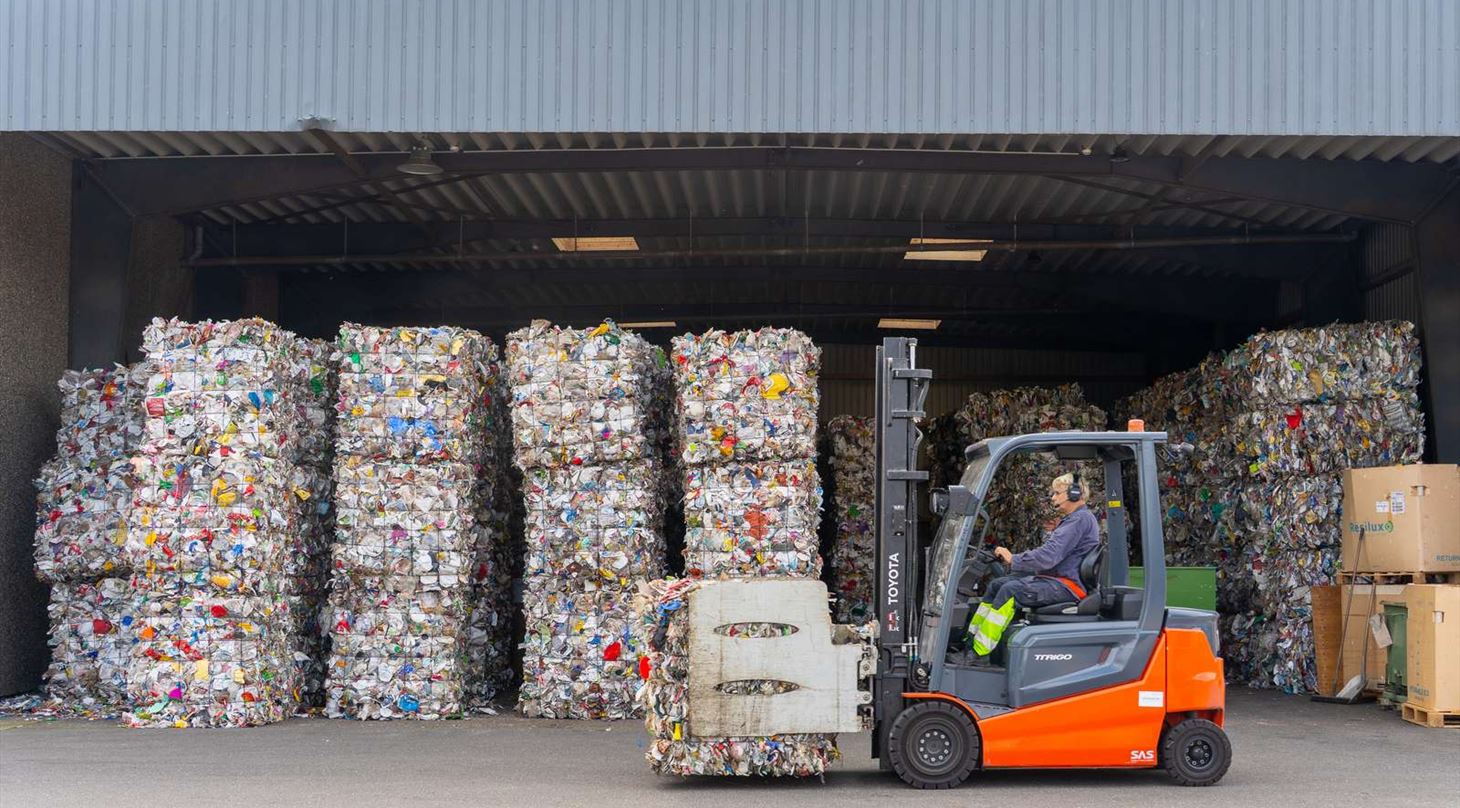
Food plastic in the bin must be reborn as new food plastic
Press release published 14 August 2025
A major Danish-led collaboration will show that plastic from used food packaging can be sorted, purified and recycled into new food-grade packaging.
Every EU citizen generates 36 kg of plastic packaging waste per year, approximately 40% of which comes from food and beverages. While most beverage bottles are recycled into new bottles, other types of packaging waste are incinerated or end up in low-quality products. A Danish-led flagship project, CRISP, now aims to demonstrate that plastic from ketchup bottles, yoghurt pots and ice cream tubs, for example, can be sorted, purified and recycled into new food packaging – safely, efficiently and on a large scale.
Chasing a breakthrough in the bin
Most people don't think about it when they throw an empty ketchup bottle or yoghurt cup in the plastic container. But this type of plastic is one of the cleanest and most valuable - and should be able to be used again and again. This just doesn't happen today, where the plastic typically ends up in low-quality products or in incineration. A Danish-led partnership will now develop and demonstrate cutting-edge technologies that can take food packaging into the circular economy.
- It will be a breakthrough if we can show that Danes' used hard plastic food packaging can be collected, sorted and recycled into new food packaging. Now we have both the legislation and the partnership in place to make this a reality," says Per Sigaard Christensen, Business Manager at the Danish Technological Institute.
The Danish Technological Institute has gathered the companies, which cover the entire value chain from waste sorting and plastic recycling to packaging and food production.
Together, they must capitalise on the EU's green light to develop new technologies so that more types of food packaging can be recycled. This includes polyethylene and polypropylene plastics (PE and PP), which are used in plastic packaging for a wide range of foods such as ketchup, mayonnaise, feta cheese, yoghurt, condiments, ice cream, sweets and much more.
From cosmetics quality to food quality
The CRISP partnership builds on previous experiences of successfully recycling household plastic waste into cosmetic-grade packaging.
- For several years, we have been working hard to improve the quality of recycled plastic. We have already proven that we can produce recycled plastic for cosmetics packaging from household plastics. Now we are taking the crucial next step towards food-grade recycling," explains CEO Franz Cuculiza from the plastic recycling company Aage Vestergaard Larsen.
To improve the quality of the recycled plastic, the CRISP partners will further develop and demonstrate:
- Advanced sorting technology with AI and cameras that can recognise food packaging among other plastic waste
- Effective cleaning methods that can remove all unwanted substances from plastic waste
- New packaging designs specifically adapted to recycled plastics and research into what makes consumers accept recycled plastics in food packaging
By the end of the project in 2028, the goal is to have established a production-ready supply chain with the capacity to handle a minimum of 10,000 tonnes of plastic annually.
Filling a gap for the food industry
For food manufacturers, the CRISP partnership has the potential to fill a critical gap: access to food-grade recycled plastics, which are in high demand in the industry. A circular economy for this type of plastic can future-proof manufacturers like Arla, both in terms of future legislation, their own sustainability goals and consumer demand for greener packaging.
- For Arla, it is crucial to find packaging solutions that both protect our products and reduce the environmental impact. Today, we don't have access to food-grade recycled PE and PP, which limits our ability to increase the share of recycled material in our packaging. The CRISP partnership can be a key to ensuring this," says Grane Maaløe, Sustainable Packaging Manager at Arla.
FACTS ABOUT CRISP
The aim of CRISP (2025-2028) is to further develop and demonstrate technology to recycle PE and PP food packaging from household plastic waste into new food contact approved packaging. CRISP stands for "Circular Recycling Innovation for Sustainable Packaging". The partnership is supported by the Environmental Technology Development and Demonstration Programme (MUDP) under the Ministry of Environment and Gender Equality as a lighthouse project.
In the EU, around 83 million tonnes of packaging waste is generated every year, of which 19% is plastic - around 16 million tonnes of plastic packaging. Much of this plastic goes to the food and beverage sector, which accounts for over half of the total packaging market in the EU.
The CRISP partners
Svensk Plaståtervinning (advanced plastic sorting)
Aage Vestergaard Larsen (plastic recycling company)
Amcor (plastic recycling company UK)
Amcor (packaging manufacturers DK)
Pharma-Tech A/S (packaging manufacturers)
Arla Foods amba (food producers)
Nestlé Nordics (food producers)
VANA (producer responsibility organisation)
Danish Technological Institute (project manager and knowledge partner)
Contact
Line Rold Tousgaard
Project Manager, Danish Technological Institute
Tel: +45 72 20 23 89
E-mail: lrto@teknologisk.dk
René Wad Andersen
Senior Communications Consultant, Danish Technological Institute
Tel: +45 72 20 14 74
Email: rea@teknologisk.dk
